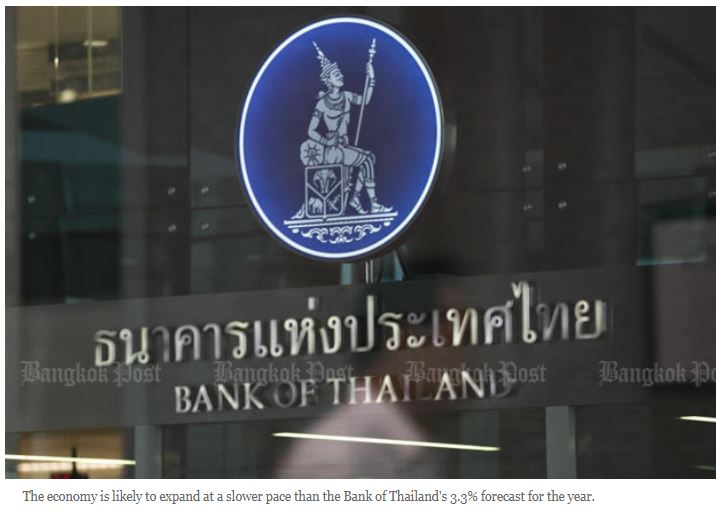Thailand: Economy poised to grow at slower clip than BoT’s forecast
The economy is likely to expand at a slower pace than the Bank of Thailand’s 3.3% forecast for the year because of subdued exports and domestic consumption, adding to signs of a further projection rollback.
The economy moderated in June from May in terms of both domestic and external demand, said Don Nakornthab, senior director of the economic and policy department at the central bank.
Private investment, state spending and exports weighed on the economy in June.
“The second quarter is expected to be the nadir for this year,” Mr Don said.
The economy expanded at the slowest pace in more than four years in the first quarter, rising 2.8% year-on-year.
The value of merchandise exports further dipped by 2.1% year-on-year in June, narrowing from a contraction of 7.2% in the previous month. The continual contraction could be attributed to weaker global demand as a result of slower economic growth in a number of major trading economies, the protectionist trade policies of the US and China, the continued downturn in the electronic cycle and the decline of global crude oil prices.
The outbound shipment contraction deepened to 4.2% in the second quarter from 4% in the preceding three months.
Although exports for the second half are expected to fare better than in the first six months, the July-to-December half could be softer than forecast because of slower-than-expected exports in July and August.
“Export growth could shrink and perform worse than the forecast of flat growth for this year,” Mr Don said.
The central bank in June cut its GDP growth forecast for 2019 to 3.3% from the 3.8% predicted three months earlier and slashed the payment-based exports forecast to zero growth from the 3% rise seen in March.
Private consumption indicators in June expanded at a slower pace in almost all spending categories, particularly from a contraction in spending on durable goods for the first time since December 2017, Mr Don said.
He reiterated that hot-money inflows are undesirable, unlike foreign direct investment.
The central bank still has tools to combat short-term speculative inflows after it implemented three measures that included tapering of short-term bond supply, a cap on the outstanding balance of non-resident accounts from 300 million baht per person to 200 million, and a reporting requirement for the names of end beneficiaries for all non-residents’ holdings of Thai debt securities.
The central bank’s verbal intervention in the foreign exchange market represents another mechanism for curbing offshore fund inflows.
The baht is the best-performing currency in the year to date, strengthening 5.9% against the US dollar.
Source: https://www.bangkokpost.com/business/1722235/economy-poised-to-grow-at-slower-clip-than-bots-forecast


 English
English




